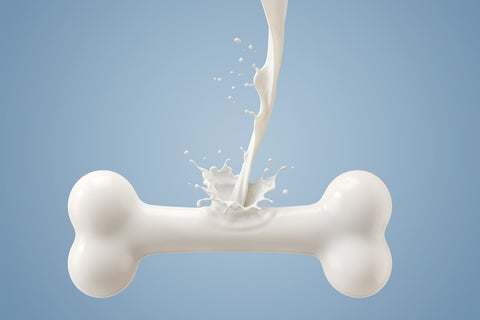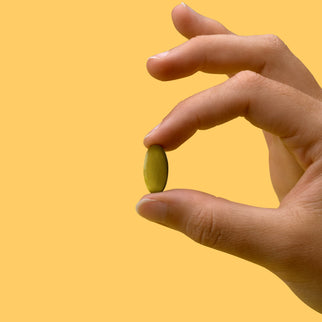Are you getting what you need to support your support system? Your bones make up your foundation, giving you stability and strength, but it's crucial you get the proper nutrients to keep them strong and sturdy. Missing out on key nutrients can lead to bone weakness and fragility.
Sometimes it can be challenging to get all the nutrients you need for healthy bones from diet alone, but with the right supplements, you can still obtain the necessary nutrients. The most important thing is knowing which ones you need to get. At iwi life, we want to help, giving you a rundown of the best supplements you can take to support your bone health.
What Are the Best Supplements for Bone Health?

You should always strive to receive a diversity of nutrients from a wide array of foods, but that is often easier said than done. Fortunately, by taking the right supplements, you can support and maintain healthy bones by promoting bone growth, density, and strength. The following are some of the most important supplements to consider as you strive to support your bones.
Calcium
Calcium is one of the most vital nutrients for maintaining strong bones, as it helps with bone growth and maintaining bone density. Many Americans obtain less than their recommended daily intake of calcium. A healthy daily intake of calcium is about 1,000 mg. For women over 50 and men over 70, the recommended intake rises to 1,200 mg per day.
You can obtain calcium from various sources in your diet, like milk, yogurt, leafy greens, fish with soft bones, and fortified foods like cereals, soy products, and plant milk. However, your body does not absorb all the calcium you consume. The absorption rate depends on the type of food. For example, although dairy products contain a high amount of calcium, your body only absorbs 30% of the amount you take in.
Consequently, calcium supplementation may be a good idea to ensure you are obtaining the daily recommended amount. Supplementation is especially helpful for those on a plant-based diet or those with very high protein diets.
Different calcium supplements offer different benefits. For example, calcium citrate is easier for the body to absorb than calcium carbonate, but calcium carbonate provides more elemental calcium per supplement. You should talk to your doctor to see if supplementation is the right choice for you and, if so, which to take.
Vitamin D
Although calcium is one of the most important supplements you can take to support your bones, vitamin D goes hand-in-hand. Vitamin D is necessary for helping your body absorb calcium. Without adequate amounts of this necessary vitamin, your body will not be able to use calcium as effectively, leading to potential weakness and lower bone density.
Experts recommend that adults receive around 600 international units, or 15 micrograms, of vitamin D daily. Good sources of vitamin D include dairy products, salmon, egg yolks, and fortified foods like cereals. Your body can also convert vitamin D from sun exposure, but many variables can affect your ability to obtain the nutrient from the sun, like weather and skin tone. Supplementation can help you maintain a stable intake each day.
Vitamin C
This critical vitamin plays many roles in the body, and although it is not most well-known for its impact on bone health, it does have an essential part in supporting it. Vitamin C helps the body form the protein collagen, which is crucial for bone mineralization, the process where calcium enters and hardens the bone. Good sources of vitamin C include leafy greens, vegetables, peppers, and citrus fruits.
Collagen
Collagen is crucial for bone mineralization, which is vital for the strength and density of your bones. Although collagen is produced by the body, it does help to obtain it through diet since it offers so many benefits, including supporting your skin structure and elasticity. Collagen is especially helpful for post-menopausal women to help maintain bone density.
Collagen can be found in bone broth, eggs, and meat. For an extra boost, you can receive it through powdered supplements, often made from animal tissues. Since those on a plant-based diet cannot obtain collagen directly, you can find supplements formulated to help support the body’s collagen production, which typically include vitamin C and algae oil — luckily enough, both featured on this list.
Magnesium
Magnesium is a necessary mineral, especially when it comes to supporting bone health. In the body, 60% of magnesium is stored inside the bones. The mineral plays an important part in the bone-building process as it can help support bone building and affects the body’s ability to regulate calcium levels.
Magnesium deficiency can lead to weak bones and an increased risk of fractures — and as it turns out, nearly half of all Americans and nearly all seniors over age 70 are not meeting their daily requirements of magnesium. Magnesium supplementation is particularly helpful for postmenopausal women with lower bone mineral density.
Experts recommend that adult men obtain between 400 and 420 mg each day and that adult women obtain between 310 and 320 mg. Magnesium can be found in whole grains, dark-green, leafy vegetables, dairy products, dried beans, and legumes.
Omega-3

Omega-3s are essential polyunsaturated fatty acids that make up the membranes of many cells throughout the body. The two most important omega-3 fatty acids are docosahexaenoic acid (DHA) and eicosapentaenoic acid (EPA). These omega-3 fatty acids have been linked to supporting bone strength, specifically because of their potential ability to support proper calcium absorption.
Omega-3s also have an essential role in forming the materials that create a cushion of support for your joints, supporting comfortable mobility as you age.
The most popular source of omega-3s is fish, including salmon, mackerel, sardines, and tuna. Many people prefer to obtain their omega-3s through either fish or krill oil. The reason that fish are so rich in omega-3s is actually because of their diets. Fish eat large amounts of algae, which is an excellent source of omega-3 fatty acids.
Algae-based supplements are a great option for those on a plant-based diet or those who are simply not enticed by the taste or smell of fish and fish oil. Plus, algae-based omega-3s are absorbed by the body at least 1.7X better than those from other sources. The powers of algae are demonstrated by iwi’s omega-3 supplement, which can help you get your daily recommended intake of DHA and EPA omega-3 fatty acids.
Start Supporting Your Bone Health Today
Your bones need a wide range of nutrients to stay strong, so you should try to get as many as possible through your daily diet or supplementation. At iwi, we want to make it easy to get the nutrients you need with our omega-3 supplement.
Just two softgels a day can help you make strides toward supporting your bones, joints, and overall well-being. Our completely plant-based supplement is an excellent choice for adding important omega-3 fatty acids to your diet. Try it for yourself and experience the many benefits of omega-3s, from bone health to heart health.
Sources:
Calcium and calcium supplements: Achieving the right balance | Mayo Clinic
Magnesium | The Nutrition Source | Harvard T.H. Chan School of Public Health
The Best Way You Can Get More Collagen | Cleveland Clinic
Magnesium is essential to your health, but many people don’t get enough of it | The Washington Post



















